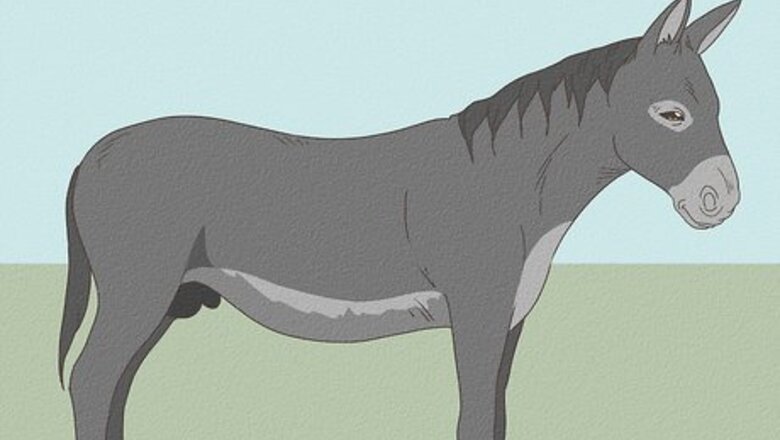
views
X
Research source
Choosing and Handling a Donkey
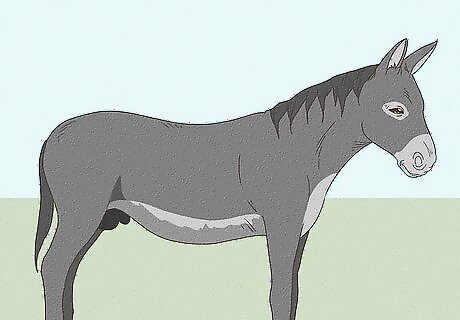
Pick a donkey of the right size, sex and temperament. When you're picking out a donkey, it's important to take these factors into consideration. Male and female donkeys have different temperaments, and there are miniature, standard and giant-sized donkeys which are as big as standard horses. Figure out which type is the right fit for your needs before you decide which one to bring home. If you plan to keep your donkey as a pet, choose a gelding (a castrated male) or a jenny (a female). If you plan to breed your donkey, you'll need a jack (an intact male) and one or more jennies. Don't get a jack if you just want a pet and don't keep a jack with other male donkeys, since they'll fight. If you plan to ride your donkey, make sure it's big enough to handle your weight. A donkey can safely carry 20% of its body weight. Also, just like mule, horse or camel, make sure they are not sick or injured, because this could make it worse If you plan to use your donkey as a guard animal against predators, such as wolves or dogs, choose a standard or giant donkey, not a miniature. It's important that the donkey be larger than the predator.
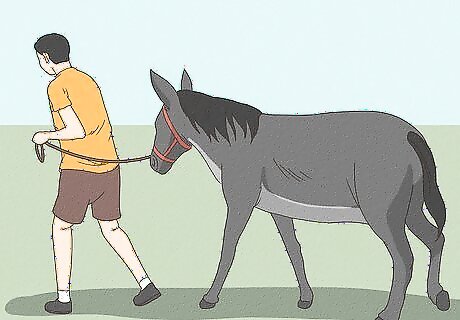
Make sure the donkey has basic training. If this is your first time handling a donkey, you'll want to choose one who already knows how to stand and walk on a lead without bolting. You may also want to make sure the donkey can handle being petted all over its body and will allow you to lift its feet without trouble. Donkeys can be a little tricky to train, so unless you're experienced with them, it's a good idea to choose one that is fairly well behaved or find a friend to help you.
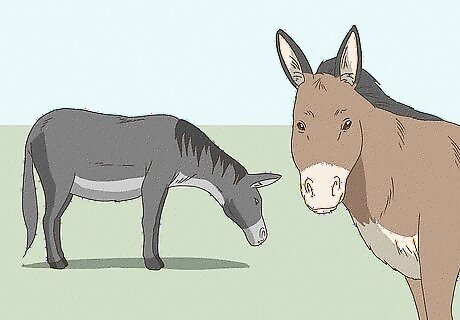
Keep more than one donkey if you can. Donkeys are extremely social creatures and they get sad when they're left all alone in the pasture. Your donkey will be a lot happier with a companion. Two jennies, two geldings or a jenny and a gelding make good companions for each other. Donkeys will bond deeply with their companions for life, and they won't want to go anywhere without each other. Donkeys can bond with horses but if you ever plan to take the horse somewhere without the donkey, it's not advisable to allow them to create a deep bond. The donkey will become upset when you remove the horse from the pasture. It's better to keep them in separate enclosures. Donkey have very specific dietary needs, and if kept with other species are likely to become overweight and unwell. Donkeys and dogs don't make good companion animals unless they're raised together from the time they are babies. If using the donkey as a herd guardian, get only one so that it bonds to the herd rather than the other donkey.
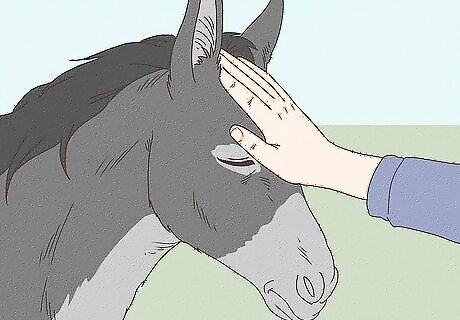
Be gentle with your donkey. Donkeys should not be harshly punished. Practice gentleness and patience when you're trying to lead them or teach them something new. They aren't stubborn, but they need time to process situations before deciding what to do, and they dislike being hurried or forced to act. Pet your donkey, speak in soothing tones, and don't raise your voice or be forceful.
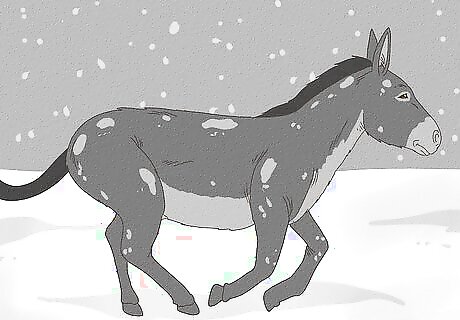
Let your donkey exercise every day. In order to stay fit and healthy, they need daily exercise. They'll exercise themselves if they have a large enough pasture to roam around. You can also take your donkey for a walk using a long rope lead. Remember that it's not a good idea to ride your donkey unless it's large enough to support your weight. Let your donkey get extra exercise in winter. If you have to shut your donkey up during winter, you will need to let it out every few days for exercise. If you can allow the donkey to wander around the barn in between outdoor outings, this would be ideal. Don’t force a donkey that hates snow to go out into the elements; provide this animal with an alternative indoor exercise area. Keep a coat on the donkey if you’d like during winter outings to prevent chills; donkeys can get pneumonia or bronchitis if subjected to rain or very cold weather.
Providing Food and Shelter
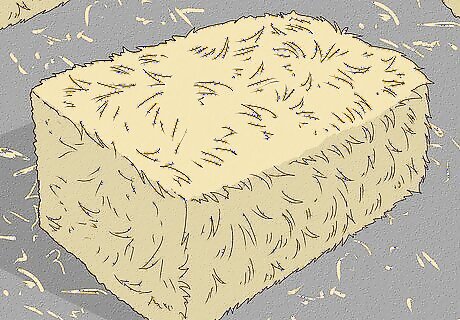
Donkeys' main food sources should be low sugar and high fibre. Barley straw (the stalk of the plant after the grain has been harvested) is a great option for this and means they can happily munch for hours on end without gaining weight.
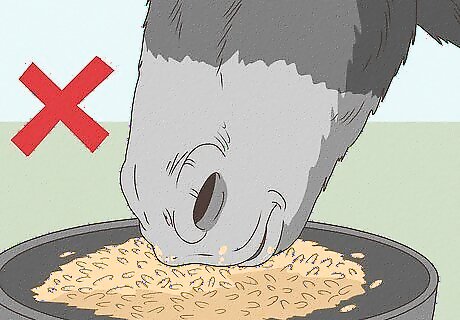
Donkeys need to eat little and often (like other equines) and don't do well if fed large amounts of food in one go i.e. a morning and evening 'bucket feed'. You should avoid feeding your donkey any cereals or grains such as oats, barley, wheat and corn (maize). These products are too high in starch and sugar and have been implicated in the development of diseases such as laminitis in donkeys, as well as a leading cause of obesity.
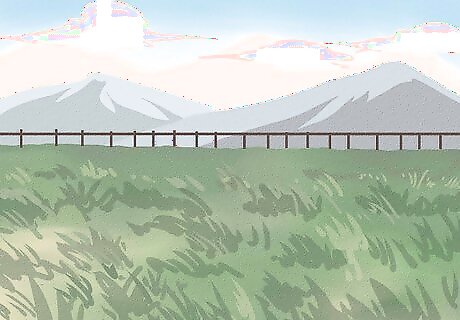
Donkeys are happier with plenty of space to roam around and graze, which they do for the majority of the day. Its hard to say specifically how much grass a pair of donkeys needs as grazing can vary so much. Grass should be considered an additional to straw, rather than making up the majority of their diets.
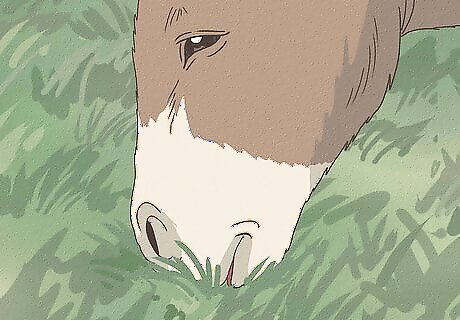
A great alternative to lush pasture is having a dirt paddock, or a non-grazing area, such as a concrete yard, or a sand school. Donkeys always need to have something to nibble on so make sure you keep an adequate supply of straw available at all times. During the winter, when the grass is dead, or at other times of year when there's not enough grass, you can supplement your donkey's diet with meadow hay. This needs to be good quality in terms of being clean, well produced and mould-free, late-cut hay may be better as it is higher in fibre and lower in sugar. Avoid alfalfa unless you have a pregnant or nursing mare, or other special need animals. Make sure it's not old or spoiled, or your donkey could become sick. If you can afford chaff with additives that target hooves, coats, and so on, you may want to investigate the options available. Chaff tends to be suitable for older donkeys with teeth troubles, convalescing donkeys and nursing donkeys. Be careful not to overfeed your donkey. Donkeys become ill with life-threatening diseases when they eat too much protein and other nutrient-rich food. Donkeys evolved in the arid and semi-arid areas of the Middle East and North Africa, and as a result can get all the nutrients they need from high fibre, scrubby pasture. When grass is too rich or abundant (think dairy or horse pasture), you might have to limit the area available to them to prevent them from eating too much and gaining too much weight. Rigging up a safe, movable electric fence will allow you to portion off the field and restrict the amount they can eat. Move the fence regularly to give them a little bit of fresh grazing.
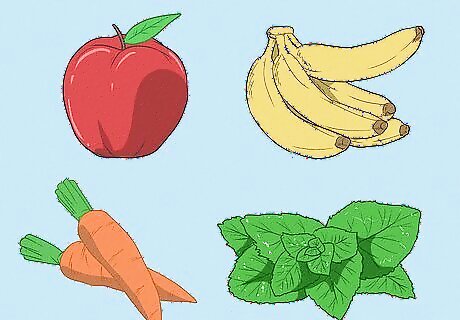
Give appropriate treats. As stated above, donkeys put on weight easily, so be careful with the treats. Give no more than a handful of any treat at a time. Apples, carrots and bananas (skins on) are ideal. Scraps from your kitchen are not a good idea as donkeys will have trouble digesting anything from the brassica family (broccoli, cauliflower etc.), potatoes, onions and many more. Fresh or dried mint leaves make a great treat. Donkeys need a simple, healthy diet and this doesn't include things like toast, biscuits or cakes. Steer clear of highly processed, sugary human and equine snacks for donkeys.
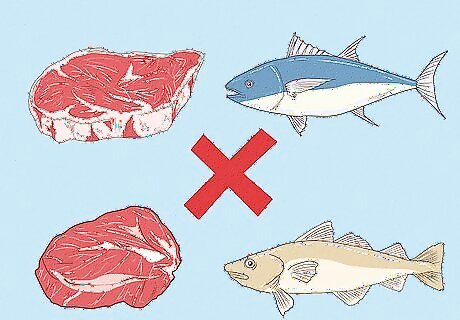
Donkeys are vegetarian and should never be fed anything derived from meat or fish.
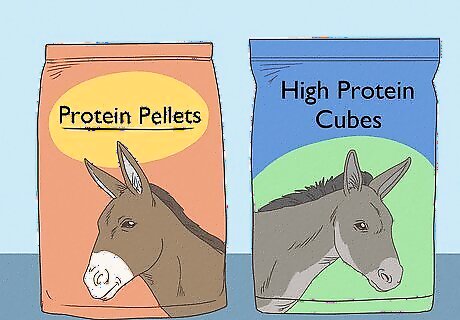
Check with your vet about dietary supplements; these may be recommended depending on the soil type of your particular region. Here are a few supplements your vet may recommend: An equine specific salt/mineral licking-block may be helpful, but check with your vet first. Chose one that doesn't contain molasses, otherwise they will just be licking the block for the sweet sugar taste. High fibre cubes—may be fed to donkeys needing to gain a little weight, try to find one targeted specifically for donkeys (you may be out of luck here depending where you live), or a second best would be one for good-doers and ponies. Freeze-dried grass—may be a useful supplement for some ill, underweight donkeys to get them back on form, make sure it is pesticide-free, and never feed a donkey grass clippings as the type of grass may be harmful to the donkey. Be cautious feeding freeze dried grass in any quantity as the high sugar levels could be dangerous to a healthy animal and trigger the painful hoof disease called laminitis. Protein pellets/cubes—these pre-made pellets contain essential nutrients; they're useful for nursing mothers with foals or for donkeys living through very cold winters that might need a boost. Otherwise, this feed is too rich for everyday purposes. Never substitute with pellets meant for a different animal (e.g. poultry pellets); some pellets contain meat and this is poisonous to donkeys. Carrots—what ungulate (hoofed animal) doesn’t love a carrot?
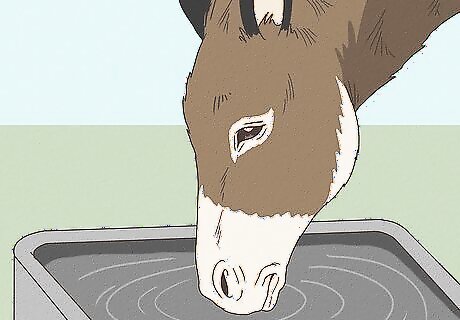
Provide clean, fresh water. Set up a water trough or bucket and keep it full of fresh, unfrozen water at all times. Make sure it doesn't leak onto the floor of the donkey's shelter, since they need a completely dry floor for their hooves. Don’t forget to check in winter to see whether it has frozen over; if it has, you’ll need to clear the ice away, or equip the tank with a heater. Older donkeys will really appreciate a drink of warm water in the winter.
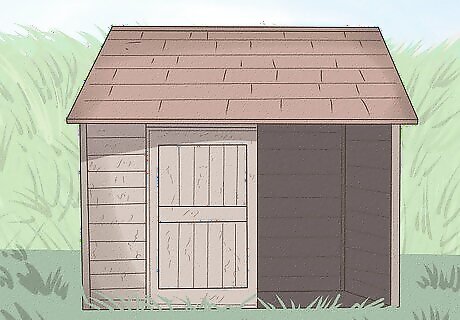
Set up a dry shelter with hard floors. Donkeys originated in a desert climate. They prefer warmer weather but are very hardy, provided they are given adequate accommodation. Donkeys do not like wind or rain and will seek shelter from both. Unlike horses, rain seeps into a donkey’s coat and makes life unbearable. The shelter doesn’t need to be elaborate, as long as it is adequate and provides the protection a donkey seeks. A shed, lean-to or barn with hard wooden floors is ideal. Make sure the floors are hard and dry. Donkeys have porous hooves that can become diseased when they stand in wet areas for too long. In a temperate climate, provide a shelter which consists of a minimum of three walls, with adequate backspace to get out of the rain and wind. This might be a shed, a stable or even a small barn. Put straw on the ground for comfort and warmth, especially in the cooler months of the year. In a climate with severe winter (temperatures below freezing and featuring ice, snow and freezing gales), you must provide a donkey with barn accommodation. The barn should be snug; plug up any gaps that let draughts through to prevent the donkey from catching chills. A winter barn should also have adequate space for exercise, in case the donkey does not like being taken outside at all while snow rests on the ground.
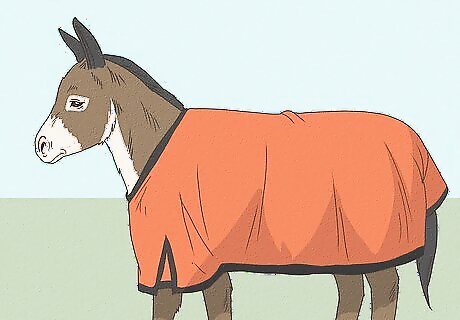
If you chose to put a rug on your donkey for the winter (seriously cold weather, or an elderly/thin donkey) then make sure you take the rug off, check for rubs and replace every day.
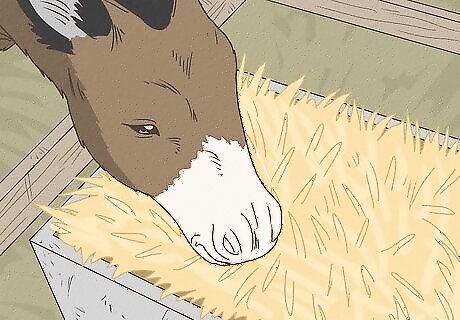
Keep the feeding area clean. To avoid possible contamination or worm problems, always keep a donkey’s feed area clean. Remove mud, wash food buckets daily and keep hay in a string basket attached to a wall (a hay-net), off the floor. Keep the shelter clean by mucking it out at least every other day to remove the donkey's waste and hay. Spray down the floor and walls and allow them to completely dry out before the donkey uses the shelter again.
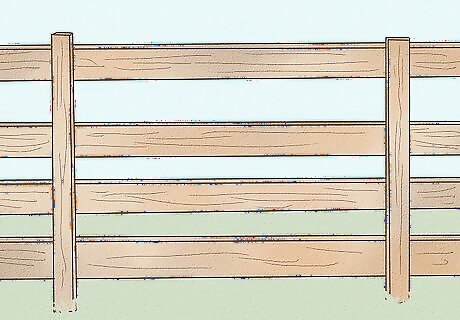
Surround the area with a sturdy fence. To keep your donkey in and to protect your donkey from predators such as dogs and wolves, or from misguided attempts to push through the fence, build solid, secure fencing around the area you have set aside for your donkey. Donkeys are quite clever, and they'll find a way to escape if you don't install a good fence around the pasture and shelter area. It should be at least as high as the donkey's shoulders.
Keeping Your Donkey Healthy
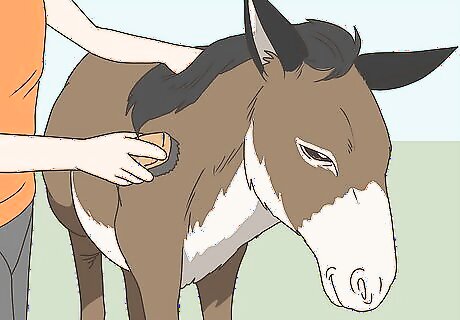
Brush the donkey regularly. The best way to clean donkeys is to brush them every day. They don't like to get wet, so it's not necessary to spray them down or give them baths. A daily brushing, as well as cleaning the muck from their hooves, will suffice.
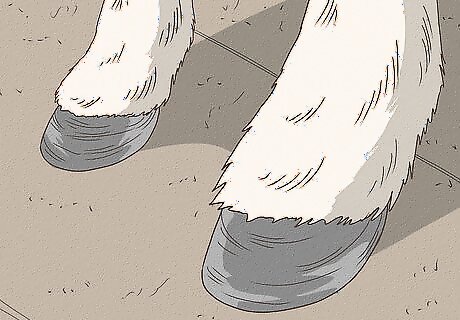
Keep the hooves dry and trimmed. Donkeys' hooves grow, just like people's nails, and they need to be trimmed from time to time so they don't get too long and crack. Have a professional farrier trim the donkey's hooves to the appropriate angle, which is 60 to 65 degrees. The donkey's hooves should be trimmed every 8 weeks or so.
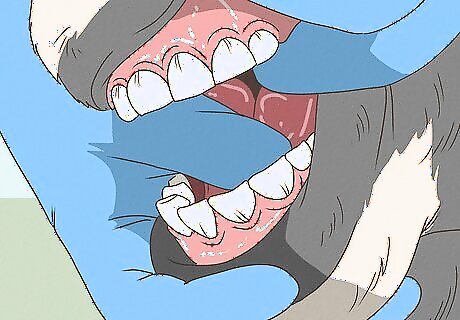
Check the teeth for sharp edges. Donkeys' teeth also grow continuously, and they get worn down when the donkey chews food. Your donkey should be seen by an equine dentist every year regardless of how the teeth appear to you. Your donkeys teeth go back as far as the length of your forearm, so there is no way to know what is going on at the back of the mouth without specialist tools. The dentist will need to check right to the back of the mouth to make sure your donkey has functioning teeth that aren't causing difficulty eating and constant pain. A donkey with poor teeth may be happier on a diet of chaff or mash/wet feed – this will obviate the need for the donkey to chew too much on grass or hay. Consult with your vet as to the best options.
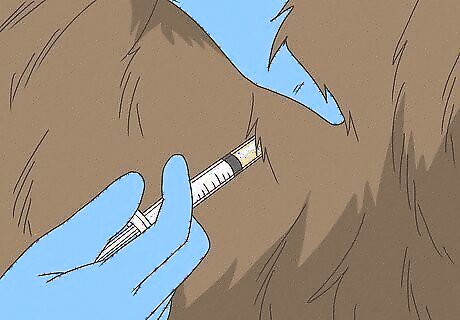
Keep vaccinations up–to-date. Donkeys are hardy and almost disease-free. They do need to be vaccinated yearly against tetanus, flu and distemper. Other vaccinations to consider, depending on where you reside, include rabies, encephalitis, and West Nile Virus.
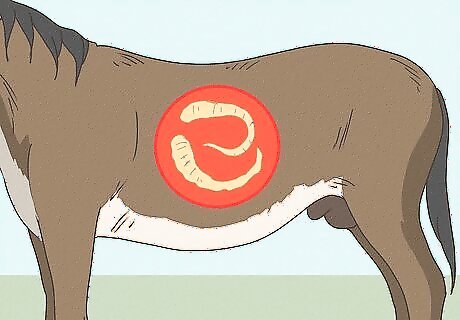
Donkeys, like horses can get intestinal worms. Both horses and donkeys are beginning to suffer due to overzealous use of wormers in the past, as now the worms aren't responding as they used to and the drugs are becoming more and more inefficient. There is no easy answer to this, but the way forward is definitely not continuing on with the same pattern of untargeted worming that has caused the situation to arise. Donkeys and horses should be have their feces tested four times a year to see what (if any) worms they have and then appropriate treatment can be given. Ask your vet to give you guidance on this, and also ask for a follow up check to make sure the treatment worked.
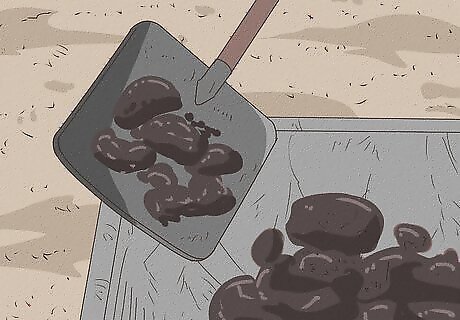
Keeping the pasture and barn as free from waste as possible will help to break the life cycle of the worm as they need to live for a certain amount of time outside the donkey before being ingested. Minimizing the number of larva that are eaten is a practical way to help combat the number of intestinal worms in your donkey. 'Poo picking' the grazing at least 3 times a week has been found to significantly reduce the number of worms on the pasture.


















Comments
0 comment